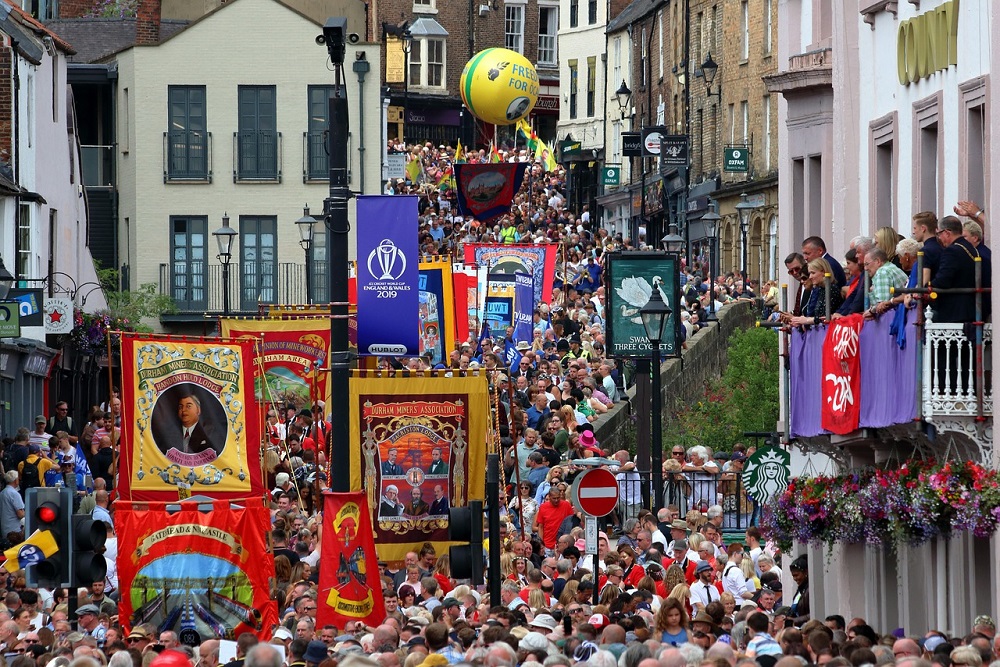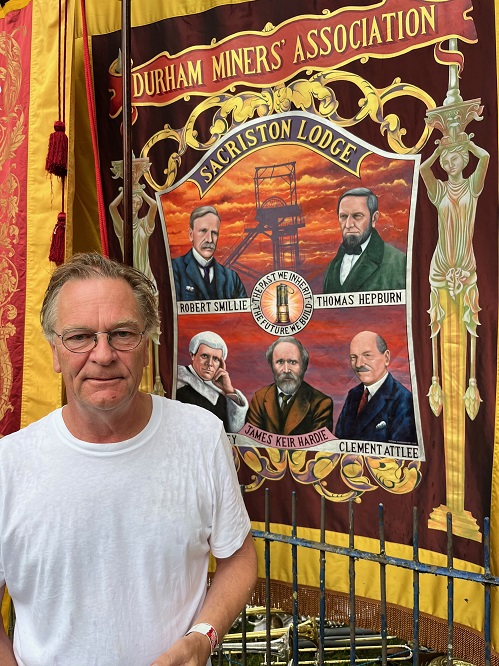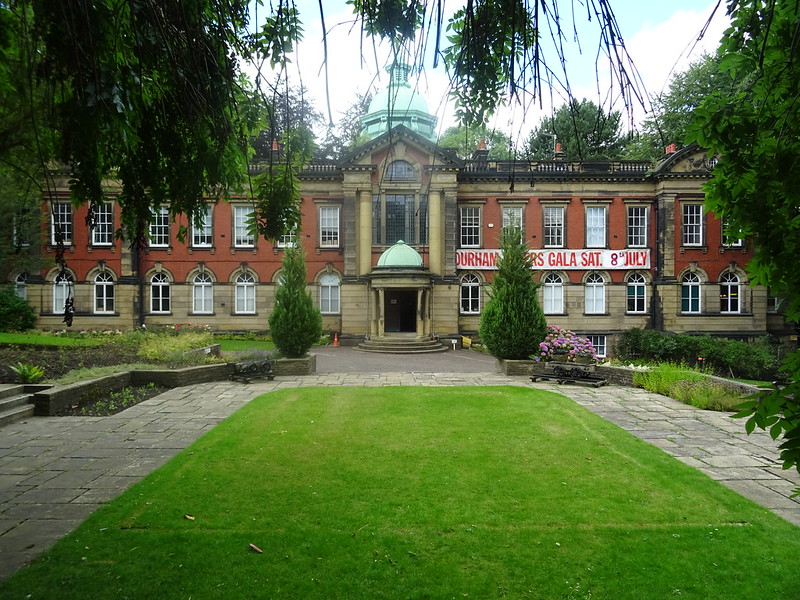Letter from Durham

Martin Shipton
Perhaps the most riveting political speech I have witnessed was delivered not by a politician, but by a trade union leader.
In 1983, at the Durham Miners’ Gala, Arthur Scargill, the President of the National Union of Mineworkers (NUM), told the crowd that the National Coal Board (NCB) had a secret hit list of more than 70 collieries that it wanted to close.
His claim was dismissed by many as fantasy at the time, but it was later proven to be true. In fact the list of doomed mines was leaked to Scargill by an official of the NCB itself.
The union president’s speech was all the more powerful because of the setting in which it was delivered: the former Racecourse in Durham, to which a lengthy procession of union banners is paraded through the ancient streets of the city, followed by an estimated 200,000 spectators.
It’s a tradition that has endured since 1871. I first attended the Gala while working for the Northern Echo, a morning paper in the north east of England where I got my first job after doing the postgraduate journalism course at what is now Cardiff University.

I lived at the time of the 1984-85 miners’ strike in a former pit village a few miles south of Durham, during which my union the NUJ paid the wages of a press officer for the NUM at a time when its funds had been seized because it had broken employment law.
It’s 29 years since the last pit in Co Durham was shut and yet the annual Gala still draws the crowds. The original mining lodge banners, representing the local branches of the NUM, remain in the procession, accompanied by brass bands, but they’re now joined by banners from other unions and organisations. The 2023 Gala was held at the weekend.
Belonging
I asked Ross Forbes, who until last year organised the Gala, to explain the event’s continuing allure. He said: “This Gala still retains its energy. People still turn up. Nobody really knows why. But I would say it’s about a deep sense of belonging – the stubbornness that people will not give up their culture despite the fact that the industry’s gone. I don’t think it’s been adequately researched by anthropologists or sociologists.
“It challenges Glastonbury in terms of attendance – last time I looked I saw that Glastonbury was turning over about £50m. The Gala, of course, is not ticketed, so we don’t get any revenue whatsoever on the day. People subscribe to be friends of the Durham Miners’ Gala. It’s called the Marras [a Geordie word meaning ‘mates’] – they pay about £2 a month, and there are contributions from trade unions etc.
“We’ve raised in recent years about £150,000. With that money we pay banner groups, of which there are 60, an allowance to bring their bands in, but it doesn’t cover all of it, so they are raising money themselves. It costs roughly £3,500 to bus the bands in for one day a year to do this crazy thing.”

Asked about the degree to which the culture celebrated in the Gala remained wrapped up in a commitment to trade unionism, Forbes said: “Its origin is obviously in trade unionism, but the Durham Miners’ Association was more than just a trade union. It was the body politic here. Before the welfare state was established, the union looked after you from cradle to grave. So it had as much a community feel to it. It was the collective body of the community of miners.
“If your question is, how many people here today still have a very close affiliation to the trade union, the answer’s going to be different. It’s not going to be in your everyday existence. You can see that other trade unions come here because of its provenance, and because it’s the world’s biggest trade union community rally.
“People will have a different relationship with their trade union now. The Durham Miners’ Association is no longer a trade union – it can’t be because it’s hardly got any members – about 1,200 live members are left. But it still carries on, on this scale. It’s a bit of a mystery.”
Jeremy Corbyn
At one time it was a given that the leader of the Labour Party would appear on the balcony of the Royal County Hotel to watch the procession as it passed, but the tradition fell into disuse and after a brief revival when Jeremy Corbyn led the party it’s been abandoned again.
Sir Keir Starmer was nowhere to be seen at the weekend, although his deputy Angela Rayner was in the Royal County’s bar the evening before the Gala, while Corbyn – now suspended by Labour – made another appearance on the balcony.
Forbes spoke about the tensions between the Gala and Labour, putting it into the context of history: “You have to remember just how wealthy, organised and powerful the Durham Miners’ Association was in its heyday. It was one of the power brokers within the British Labour Party. If you wanted to be leader of it, you had to have the Durham miners’ vote or it wouldn’t happen. So from the period beginning in 1910 right through to the middle of the 1960s, the Durham Miners’ Gala was used almost like a Mafia funeral, where people came to make deals.
“You’d see the American Ambassador, the Israeli Ambassador, the Russian Ambassador in the Royal County Hotel, on the balcony, with Prime Ministers of the day and leading members of the British labour movement. That was at a high point of empire, through the world wars.”
But the Durham coalfield had been on the decline since prior to the First World War and it had a long downward trajectory until the last mine closed in 1994.
“The relationship with the Labour Party changed after the 1984-85 strike. Durham was always seen as a moderate coalfield – very compliant with the state. But then the leadership switched to the left. There was a rank and file movement that began in the mid-Seventies, supporting Arthur Scargill etc, and the Labour leadership felt, I think, that they didn’t have any affinity with that type of politics.
“Every year since the inception of the Labour Party, the leader of the Labour Party has been invited. It is up to the leader of the Labour Party to decide whether he or she would come. Generally they have other diary commitments.
“There has always been tension between organised labour and the Parliamentary party. That’s pretty well documented throughout the history of trade unions and the Labour Party. The interesting thing about the Labour Party is that it was begat of the unions: it’s a trade union party. It baffles a lot of French or Italian or Spanish trade unionists, who say ‘Why would you want one of them? Why do you want a Parliamentary party for trade unions?’
“And therein I think lies the real divide. The Labour Party is involved in managerial politics. Trade unions are there to fight for their members’ betterment, quite often in reactive circumstances, and they represent really only the working class. The Labour Party is a much broader church, as the cliché goes. So there’s an inherent tension there.
“All that having been said, the Durham Miners’ Association has given service, money, platforms to the Labour Party over the years, and it’s up to the Labour Party leadership to decide how they react to that, They’ve never paid a penny to the Gala, yet they share the platform and have spoken here since the inception of the Independent Labour Party [in 1893].
“It’s somewhat baffling as to why they can’t make an accommodation with their people. I know for a fact that when Momentum came to look at this, they decided that the Durham Miners’ Gala had no political or financial capital for them and they wouldn’t get involved.
“So it’s up to them. From a personal perspective, I don’t think it really matters. This [Gala] is about people. I would rather that the divisions and schisms within the Labour Party were kept away from this, because it takes away from the real narrative of what this is all about. This is the people’s day – it’s by the people and for the people, and always has been, and they still pay for it themselves. If the Labour Party doesn’t want to bring a bottle to the party, then don’t bother coming.”
Redhills
Forbes is currently leading a fundraising effort for a project to restore Redhills, the magnificent headquarters of the Durham Miners’ Association that is a Grade II listed building and on Historic England’s Top 100 Irreplaceable Places list.

Also a potential candidate for UNESCO World Heritage Site status, Redhills includes a debating chamber known as the Pitman’s Parliament. Forbes said: “The Pitman’s Parliament was quintessential democracy. Each one of the seats in there, of which there are 298, has a number on it, and that number corresponded to the delegate from the colliery. They were there not just to represent people industrially. They took decisions there to build welfare halls, sports grounds, and aged miners’ homes. They built a proto welfare state with their own money.
“You would come, let’s say, from Sacriston Colliery, and you’d have to go and put their case in front of all of your comrades, or probably 200 of them. If you wanted to build a sports ground, you’d probably have to raise some of the money yourself and go to the Pitman’s Parliament to argue for the rest.
“This is just an example. And, of course, they were making decisions on health and safety, wage rates and all sorts. You’d have to come up with persuasive arguments and hope you’d get it – otherwise you’d have to explain yourself to the people of Sacriston. It was a very onerous, a very intense form of democracy.
“What we want to do with Redhills is make it a place where music’s performed, spoken voice will be there, used for education, but it will also be used for people gathering together to debate the state of the nation. So we’re not really doing anything new with it – we’re just reviving its function.
“The possibility of gaining World Heritage Site status is not necessarily about the bricks and mortar of the building. It’s about the contribution organised labour made in terms of social and political reform throughout the world.”
It’s certainly possible to argue that the creation in Durham of a proto welfare state was comparable to the birth of the NHS from ideas developed in Tredegar. Forbes said: “The Durham miners were differently organised politically, but their intentions were the same.
“The South Wales Miners’ Federation did the same sort of welfare provision – it was cradle to grave, with the union being the body politic. There are parallels between them, and [Aneurin] Bevan was a product of that communitarian politics. That was a feature of how mining unions and miners’ associations grew up around Britain.”
As in the north east of England, the deep mining industry has disappeared from Wales: fossil fuels have had their day. But that doesn’t mean we can’t learn from the practical pioneers of social improvement who functioned both here and in the north east.
Support our Nation today
For the price of a cup of coffee a month you can help us create an independent, not-for-profit, national news service for the people of Wales, by the people of Wales.







Excellent Martin! A necessary reminder of our common experience with the North-East mining culture – and how it fed into our politics since we both arrived in Cardiff.
Good piece, it needs a wider audience…
Martin, a curious thing has just been pointed out to me by my ever watchful other half…
Overnight there was a piece in the (Aussie) Guardian concerning the visit of their PM A. Albanese to join Biden, Rishi Ji and co. He was to break his journey to see Herr Scholtz about the manufacture of an armoured vehicle for Germany in the Rheinmetall factory in Oz. This piece has since then completely disappeared, as I say curious !
Post Brexit RM have established a joint venture in Telford and RM owned RF Engines (RFEL) on the Isle of Wight…perhaps we were not meant to know that…
The miners Gala was a be a big attraction in Porthcawl at one time held by the South Wales miners until Thatcher did her hatchet work on us. She branded Miners Communists not True we where socialists in the last election i know former old miners did not vote in the last general election because of Corbyn who was a communist. The tories brand anybody who do not agree with them lefties prior to the formation of the nationanalisation of the coal industry in 1947 the old South Wales Miners Federation a union which was a forerunner to the N… Read more »